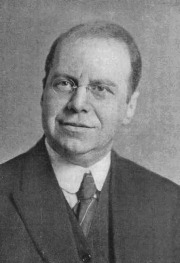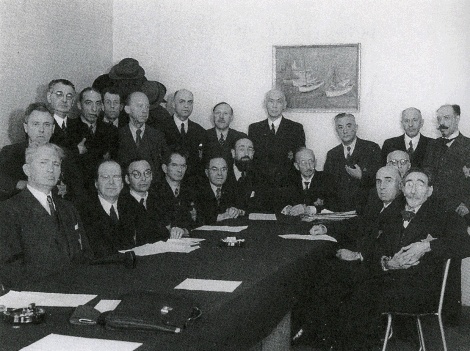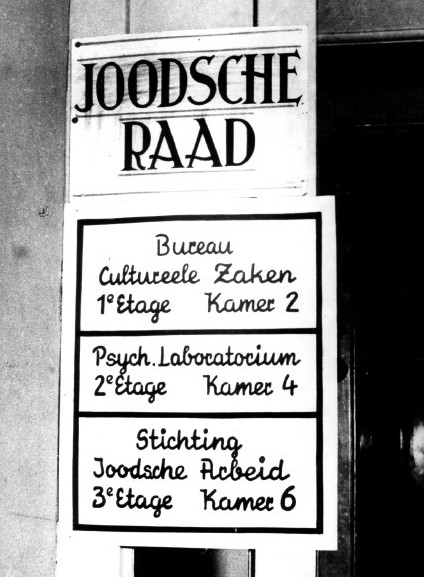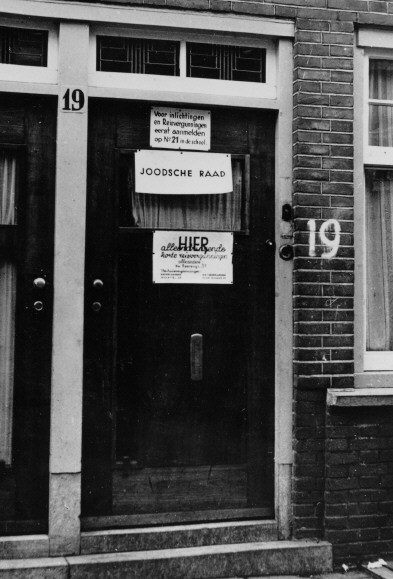David Cohen
|
David Cohen was born in Deventer, Holland in 1882, he was an expert in papyrology and became a professor of ancient history, first in Leyden, and then in Amsterdam.
He was active in Jewish affairs from an early age - he joined the Zionist movement in 1904 and held key posts in it. He was one of the sponsors and organisers of the Zionist Students Union.and the Jewish Youth Federation.
During World War One David Cohen was active in providing assistance to Jewish refugees, mainly from Germany, and became the secretary of the Committee for Refugees. He was a member of the Jewish Council in The Hague and then in Amsterdam and in 1934 was elected to the Standing Committee of the Union of Ashkenazic Communities.
In 1933 when the Nazis rose to power in Germany, it was on Cohen’s initiative that the Comte voor Bijzondere Joodse Belangen (Committee for Special Jewish Affairs) was established and he became the executive chairman of its sub-committee on refugees.
Following the German occupation of the Netherlands in May 1940, Cohen was among the sponsors of the Jewish Co-ordinating Committee set up in the December of that year.
On 12 February 1941 David Cohen together with Abraham Asscher formed the Jewish Council (Joodse Raad), at the suggestion of the Germans. They both as chairmen taking part in the daily running of the Jewish Council and determining its policy in dealing with the Germans.
During the occupation the Jewish Council under severe attack from Lodewijk Ernst Visser and from the Dutch government –in-exile, for its policy of co-operation with the Germans. This was the background for Cohen’s conflict with Visser, who was opposed to such collaboration.
In the Joodse Raad itself, there was also opposition to Cohen’s policy, but he was always successful in overcoming this resistance and obtaining majority support for his position in the Co-ordinating Committee.
Joodse Raad sign |
When the Allies broadcast their declaration on the 17 December 1942 regarding hundreds of thousands of Polish Jews being put to death by barbaric means, Asscher discounted the claims saying:
“As far as I am concerned, the reports are nothing but English propaganda, with the sole intention of inciting the world against Germany.”
David Cohen later recalled his feelings regarding the broadcast:
“The fact that the Germans had perpetrated atrocities against Polish Jews was no reason for thinking that they behaved in the same way towards Dutch Jews, firstly because the Germans had always held Polish Jews in disrepute, and secondly because in the Netherlands, unlike Poland, they had to sit up and take notice of public opinion.”
On 23 September 1943, Cohen was arrested with the other members of the Jewish Council who were still in Amsterdam and taken first to Westerbork transit camp and from there to the transit ghetto of Theresienstadt near Prague.
When he returned to the Netherlands after the war, the Dutch government instituted judicial proceedings against him, charging him with collaborating with the enemy.
The prosecutor charges that without the collaboration of the Joodse Raad, far fewer Jews would have been deported from the Netherlands. Cohen was briefly detained and in July of 1951 the Minister of Justice formally dropped the case "for reasons of general public interest."
It must be noted that Cohen's mother, three brothers, and sister were murdered as Auschwitz and Sobibor.
|
In 1947 Cohen was also charged before a Jewish Community tribunal, where he put up a passionate defence of his policy during the occupation, but he was found guilty and was barred from holding office in any Jewish institution.
In 1950 the sentence was annulled, Cohen returned to his university post, but did not become active in Jewish public life.
In 1955 he published his memoirs Zwervend en Dolend (Fugitive and Vagabond), a publication dealing with his involvement and dealings with Jewish fugitives. he died in 1967 a broken man.





No comments:
Post a Comment